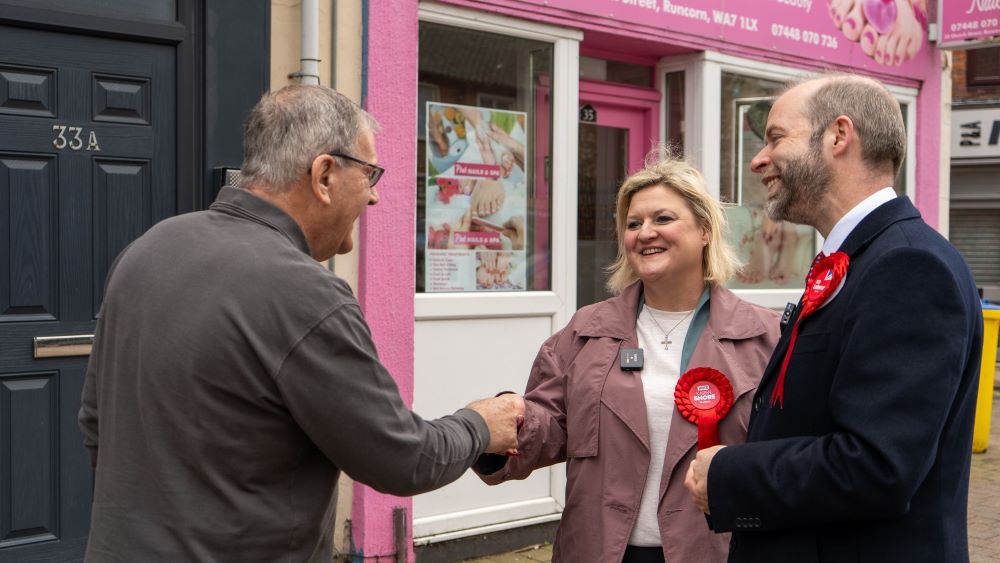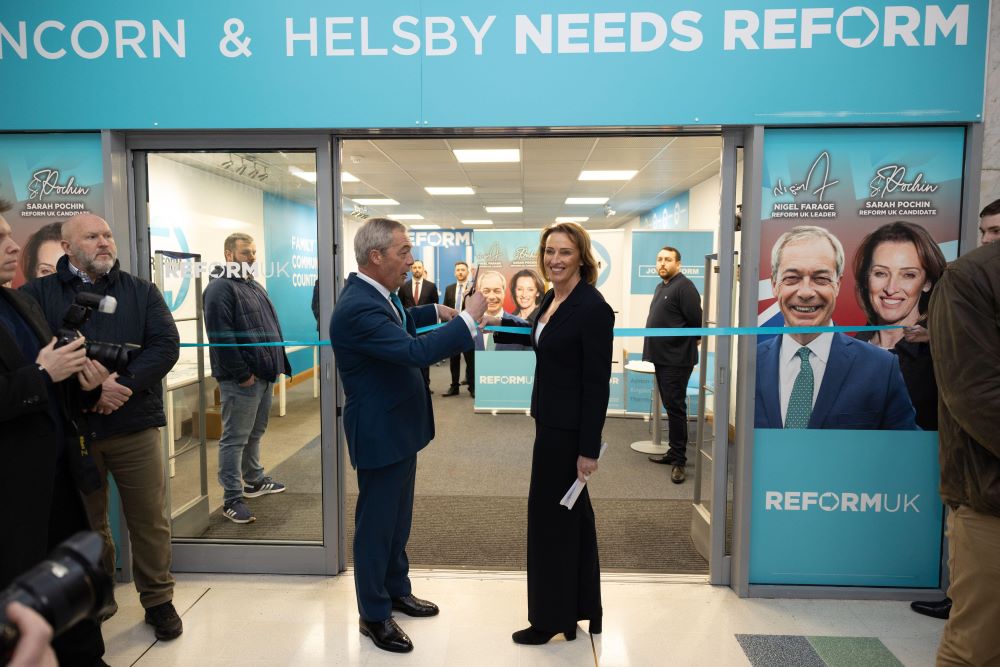Reform Puts "Mr Farage" Front And Centre Of Runcorn By-Election Campaign
6 min read
Reform UK is putting leader Nigel Farage at the heart of its campaign in Runcorn and Helsby, where it hopes to claim its first ever by-election victory on 1 May.
Voters in the Cheshire constituency will choose a new MP on the same day that local and mayoral elections will take place nationwide. The contest was triggered when the seat's former Labour MP Mike Amesbury resigned after pleading guilty to assault.
As campaigning steps up close to the River Mersey, activists on the ground believe the contest is a two-horse race between Labour and Reform. Labour won here with 53 per cent of the vote at the July general election. Since then, however, the party and leader Prime Minister Keir Starmer have seen their popularity fall sharply, while Farage and Reform have surged.
The area, described by one local Labour source as “a tale of two constituencies”, combines the industrial town and cargo port of Runcorn with surrounding rural villages, including Helsby.
When PoliticsHome visited the seat this week, there seemed to be a clear difference between campaign literature being dispensed by the parties. While Farage features heavily in his party's material, images of the Prime Minister, as well as Conservative Party leader Kemi Badenoch, are more difficult to find on their parties' leaflets.
Dr David Jeffrey, a senior politics lecturer at the nearby University of Liverpool, said he felt that the by-election in less than three weeks was "Reform's to lose".
“The wind is in [Reform’s] sails," he told PoliticsHome.
Hoping to succeed Amesbury as the Labour MP for Runcorn and Helsby is local councillor Karen Shore, who says her "unique selling point" is that as a local, she has "skin in the game".
Her campaign is focused on the NHS, workers' rights and neighbourhood policing.
 Labour's Runcorn candidate Karen Shore campaigning with Business Secretary Jonathan Reynolds (Alamy)
Labour's Runcorn candidate Karen Shore campaigning with Business Secretary Jonathan Reynolds (Alamy)
Labour activists hope that tactical voting will help them fend off Reform. Shore told PoliticsHome that some traditional Conservative voters were willing to vote Labour this time to keep Farage's party out, and is hopeful some Liberal Democrat and Green voters could do the same. Tactical voting played a significant part at the last general election, with research finding around a quarter of people who voted Lib Dem did so for tactical reasons.
But with Labour having finished so far ahead of Reform in July (53 vs 18 per cent), why has the northwest seat seemingly swung so heavily towards the right-wing party?
Reform’s campaigning “is targeting vulnerable people with fear messages and divisive messages” as Labour works to "fix the foundations"," said Shore.
A source close to the Labour campaign admitted that Reform was a “real threat” and predicted a close result. “We are throwing everything into it and taking nothing for granted,” they said, adding that a “good ground campaign could make or break it”.

Richard Tice, Reform's deputy leader, said his party sees "national stuff appealing to people on the ground" in Runcorn.
The party's candidate, Sarah Pochin, agreed, telling PoliticsHome that the number one issue for locals in the constituency is illegal immigration. “Runcorn is being dumped on with illegal immigrants,” Pochin said, a former magistrate who joined Reform from the Tories.
Labour candidate Shore recently launched a petition to close a local hotel used for asylum seekers, a move Runcorn labelled a "U-turn".
But Pochin has also brought local issues to the fore, campaigning for an end to the local bridge toll, new leisure facilities and a regeneration of the Runcorn town centre.
She said a Reform victory in this Labour seat would serve as a forerunner to "revolutionary" change coming in constituencies across the country at the next general election. “All the eyes of the United Kingdom are focused on this election," she told PoliticsHome.
The party's campaign headquarters, which sits in Runcorn Shopping City, was set up purely for this contest, which, according to Tice, demonstrates "a proper indication of our intent".

Pochin said that the people of Runcorn who come through their doors, which she described as around 50 a day, were coming with concerns that reflect the whole of the country.
“Labour voters really do think that the government is attacking its own core support.”
She also lavished praise on the personal appeal of "Mr Farage", telling PoliticsHome the “icing on the cake is when Mr Farage comes up”.
“When you're out in the town or in a residential area with Mr.Farage, the young people come up and want selfies with him", something she said is "fascinating", adding that "you never get young people involved, I don't think historically in politics.”
What about the Conservatives? “We rarely hear the word ‘Conservative’ mentioned; it is clearly a two-horse race,” said Pochin.
With a thinned-out CCHQ that, according to Tory insiders, is stretched for resources following the party's devastating general election defeat, there is speculation from many, including Tice, that the Conservatives are doing “nothing” in the Runcorn and Helsby contest.
The Conservative candidate Sean Houlston dismissed this claim as “completely wrong”, adding that he has a “fantastic CCHQ team” for support.
Houlston said he also has had plenty of backing from neighbouring Conservative MP Aphra Brandreth, adding that nearby Tory Esther McVey has been quite supportive too.
Last month, The Telegraph reported that McVey, the former minister for common sense, had said the Conservatives should let Reform win a by-election as part of a wider electoral pact.
When asked about the incident, Houlston refused to be drawn on the issue: “I'm here every single day, fighting this election. And there's nobody else that I'm thinking of at all right now because I'm here to win this campaign."
The University of Liverpool's Dr Jeffrey said the result could be a sobering one for Badenoch.
“There is a real chance [the Tories] could lose their deposit, and that would be a real embarrassment,” he told PoliticsHome.
Every candidate has to pay a deposit of £500 to stand, with candidates who receive more than 5 per cent of the total valid votes cast eligible for a return.
A loss of the deposit for one of the two main Westminster political parties would be rare, Jeffery said, “but it is not unfathomable that it could drop down”.
